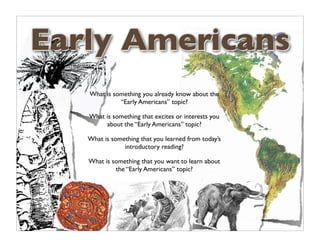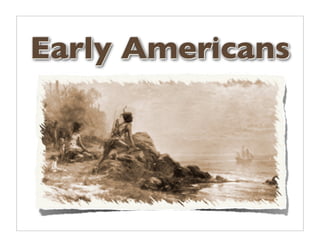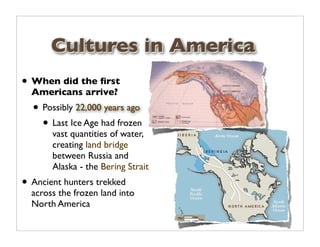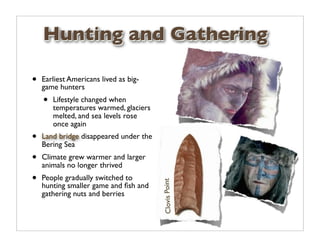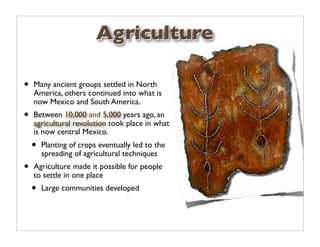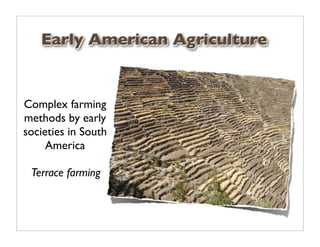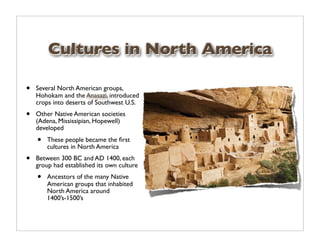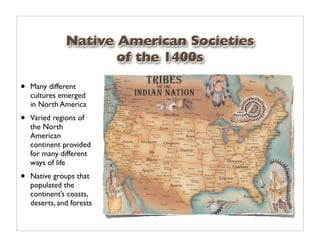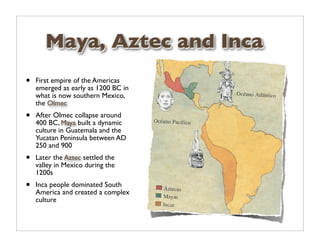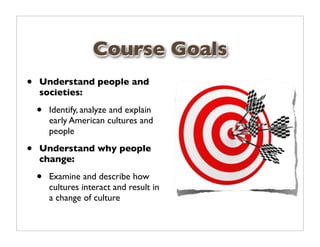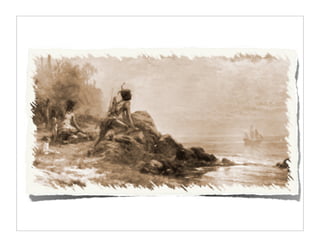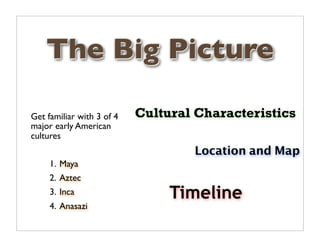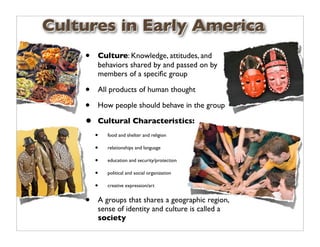Early americans course presentation pdf
- 1. Early Americans What is something you already know about the ŌĆ£Early AmericansŌĆØ topic? What is something that excites or interests you about the ŌĆ£Early AmericansŌĆØ topic? What is something that you learned from todayŌĆÖs introductory reading? What is something that you want to learn about the ŌĆ£Early AmericansŌĆØ topic?
- 3. Cultures in America ŌĆó When did the ’¼ürst Americans arrive? ŌĆó Possibly 22,000 years ago ŌĆó Last Ice Age had frozen vast quantities of water, creating land bridge between Russia and Alaska - the Bering Strait ŌĆó Ancient hunters trekked across the frozen land into North America
- 4. Hunting and Gathering ŌĆó Earliest Americans lived as big- game hunters ŌĆó Lifestyle changed when temperatures warmed, glaciers melted, and sea levels rose once again ŌĆó Land bridge disappeared under the Bering Sea ŌĆó Climate grew warmer and larger animals no longer thrived ŌĆó People gradually switched to Clovis Point hunting smaller game and ’¼üsh and gathering nuts and berries
- 5. Agriculture ŌĆó Many ancient groups settled in North America, others continued into what is now Mexico and South America. ŌĆó Between 10,000 and 5,000 years ago, an agricultural revolution took place in what is now central Mexico. ŌĆó Planting of crops eventually led to the spreading of agricultural techniques ŌĆó Agriculture made it possible for people to settle in one place ŌĆó Large communities developed
- 6. Early American Agriculture Complex farming methods by early societies in South America Terrace farming
- 7. Cultures in North America ŌĆó Several North American groups, Hohokam and the Anasazi, introduced crops into deserts of Southwest U.S. ŌĆó Other Native American societies (Adena, Mississipian, Hopewell) developed ŌĆó These people became the ’¼ürst cultures in North America ŌĆó Between 300 BC and AD 1400, each group had established its own culture ŌĆó Ancestors of the many Native American groups that inhabited North America around 1400ŌĆÖs-1500ŌĆÖs
- 8. Native American Societies of the 1400s ŌĆó Many different cultures emerged in North America ŌĆó Varied regions of the North American continent provided for many different ways of life ŌĆó Native groups that populated the continentŌĆÖs coasts, deserts, and forests
- 9. Maya, Aztec and Inca ŌĆó First empire of the Americas emerged as early as 1200 BC in what is now southern Mexico, the Olmec ŌĆó After Olmec collapse around 400 BC, Maya built a dynamic culture in Guatemala and the Yucatan Peninsula between AD 250 and 900 ŌĆó Later the Aztec settled the valley in Mexico during the 1200s ŌĆó Inca people dominated South America and created a complex culture
- 10. Course Goals ŌĆó Understand people and societies: ŌĆó Identify, analyze and explain early American cultures and people ŌĆó Understand why people change: ŌĆó Examine and describe how cultures interact and result in a change of culture
- 12. The Big Picture Get familiar with 3 of 4 Cultural Characteristics major early American cultures Location and Map 1. Maya 2. Aztec 3. Inca Timeline 4. Anasazi
- 13. Cultures in Early America ŌĆó Culture: Knowledge, attitudes, and behaviors shared by and passed on by members of a speci’¼üc group ŌĆó All products of human thought ŌĆó How people should behave in the group ŌĆó Cultural Characteristics: ŌĆó food and shelter and religion ŌĆó relationships and language ŌĆó education and security/protection ŌĆó political and social organization ŌĆó creative expression/art ŌĆó A groups that shares a geographic region, sense of identity and culture is called a society
